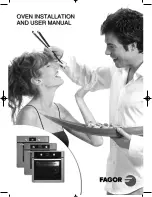
Q.
Why won't the oven light will glow?
A.
There may be several reasons why the oven
light will not glow.
■
Light bulb is burned out.
■
START has not been touched.
Q.
Does microwave energy pass through the
viewing screen in the door?
A.
No. The holes, or ports, are made to allow
light to pass; they do not let microwave
energy through.
Q.
Why does the beep tone sound when a pad
on the Control Panel is touched?
A.
The beep tone sounds to assure that the
setting is being entered properly.
Q.
Will the microwave oven be damaged if it
operates while empty?
A. Yes. Never run it empty or without the glass
tray.
Q.
Why do eggs sometimes pop?
A.
When baking, frying, or poaching eggs, the
yolk may pop due to steam build up inside
the yolk membrane. To prevent this, simply
pierce the yolk before cooking. Never
microwave eggs in the shell.
Q.
Why is standing time recommended after
microwave cooking is over?
A.
After microwave cooking is finished, food
keep on cooking during standing time. This
standing time finishes cooking evenly
throughout the food. The amount of standing
time depends on the density of the food.
Q.
Is it possible to pop popcorn in a microwave
oven?
A.
Yes, if using one of the two methods
described below:
(1) Popcorn-popping utensils designed
specifically for microwave cooking.
(2) Prepackaged commercial microwave
popcorn that contains specific times and
power outputs needed for an acceptable
final product.
FOLLOW EXACT DIRECTIONS GIVEN
BY EACH MANUFACTURER FOR ITS
POPCORN PRODUCT. DO NOT LEAVE
THE OVEN UNATTENDED WHILE THE
CORN IS BEING POPPED. IF CORN
FAILS TO POP AFTER THE
SUGGESTED TIMES, DISCONTINUE
COOKING. OVERCOOKING COULD
RESULT IN AN OVEN FIRE.
CAUTION:
NEVER USE A BROWN
PAPER BAG FOR POPPING CORN.
NEVER ATTEMPT TO POP LEFTOVER
KERNELS.
Q.
Why doesn't my oven always cook as fast as
the cooking guide says it should?
A.
Check your cooking guide again to make
sure you've followed the directions correctly,
and to see what might cause variations in
cooking time. Cooking guide times and heat
settings are suggestions, chosen to help
prevent over-cooking, the most common
problem in getting used to a microwave oven.
Variations in the size, shape, weight and
dimensions of the food could require a
variation in cooking time. Use your own
judgement along with the cooking guide
suggestions to test for doneness, just as you
would do with conventional cooking.
WARNING:
This equipment generates and uses ISM frequency
energy and if not installed and used properly, that is
in strict accordance with the manufacturer
’
s
instructions, may cause interference to radio and
television reception. It has been type tested and
found to comply with limits for ISM Equipment
pursuant to part 18 of FCC Rules, which are
designed to provide reasonable protection against
such interference in a residential installation.
However, there is no guarantee that interference
will not occur in a particular installation. If this
equipment does cause interference to radio or
television reception, which can be determined by
turning the equipment off and on, the user is
encouraged to try to correct the interference by one
or more of the following:
•
Reorient the receiving antenna of the radio or
television.
•
Relocate the microwave oven with respect to the
receiver.
•
Move the microwave oven away from the
receiver
•
Plug the microwave oven into a different outlet
so that the microwave oven and the receiver are
on different branch circuits.
The manufacturer
is not responsible for any radio
or TV interference caused by
unauthorized
modification
to this microwave oven. It is the
responsibility of the user to correct such interference.
- 17 -
QUESTIONS AND ANSWERS
FEDERAL COMMUNICATIONS COMMISSION
RADIO FREQUENCY INTERFENCE STATEMENT










































